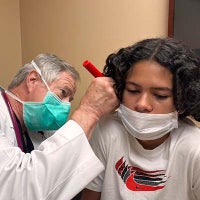Electrocardiograms a Big Addition to the 2022 Pre-Participation Physicals Event at Andrews Institute

To enhance the health screenings for high school student-athletes, electrocardiograms (ECG) were added to the pre-participation physicals (PPE) performed at Andrews Institute for Orthopaedics & Sports Medicine on Saturday, June 4. The annual event provides required physicals to student-athletes from Andrews Institute’s partner schools in Escambia, Santa Rosa, Okaloosa and Walton counties. While ECGs are not required by the Florida High School Athletic Association (FHSAA) or in those four counties, they have been shown to be useful in potentially identifying cardiac conditions that may pose a higher risk of a cardiac arrest or event while participating in athletics.
“Understanding whether a student-athlete has an underlying heart condition is obviously very important,” said Michael Milligan, M.D., MBA, CAQSM. “Andrews Institute will always be at the leading edge of care for anyone we treat, and we’re proud to go beyond what’s expected or required.
An ECG is a test that looks at the electrical activity of the heart and can help diagnose cardiac conditions like current or prior heart attack, heart muscle/chamber problems and rhythm issues.
Organization the Key to the Success of the Day
More than 1,359 hundred student-athletes from 20 schools received their physicals at this one-day event. Adding the ECGs to the process took months of planning by event organizers. “The yearly Andrews Institute pre-participation physicals day allows the student-athlete access to state-of-the-art screening for any risk areas for the planned sport year,” said Mary B. Mehta, M.D., chief medical officer, Nemours Children’s Health in Pensacola. Any student-athlete determined to have an abnormality from the ECG test will have the opportunity for a follow-up appointment with Nemours.
A Quick Test Can Make a Huge Difference
Tony Lee, M.D., FACC, from the Baptist Heart and Vascular Institute (BHVI) has been involved in the planning of the ECG addition all year and knows how vital the test can be for athletes. Dr. Lee is one of three BHVI cardiologists who participated in the event. “These tests only take a few seconds to perform,” he said, “and they help us identify cardiac conditions that pose a higher risk of a cardiac arrest or event while participating in athletics. I’m really proud we’ve worked together to make this happen.”
A Team Effort That Pays Off
Outside of the ECG testing at the PPE event, student-athletes were assessed for height, weight, vision and blood pressure, among other screenings. To make sure the students moved through the screening stations as efficiently as possible, 40 physicians and advanced practice providers and nearly 300 volunteers were on hand to help, including many from the University of West Florida Exercise Science, Nursing and Athletic Training Programs, who helped administer the ECG tests. “This is my favorite day every year,” said Kathleen McGraw, Andrews Institute sports medicine outreach manager. “It’s great to see so many organizations and people work together for the health and safety of our student-athletes.”
